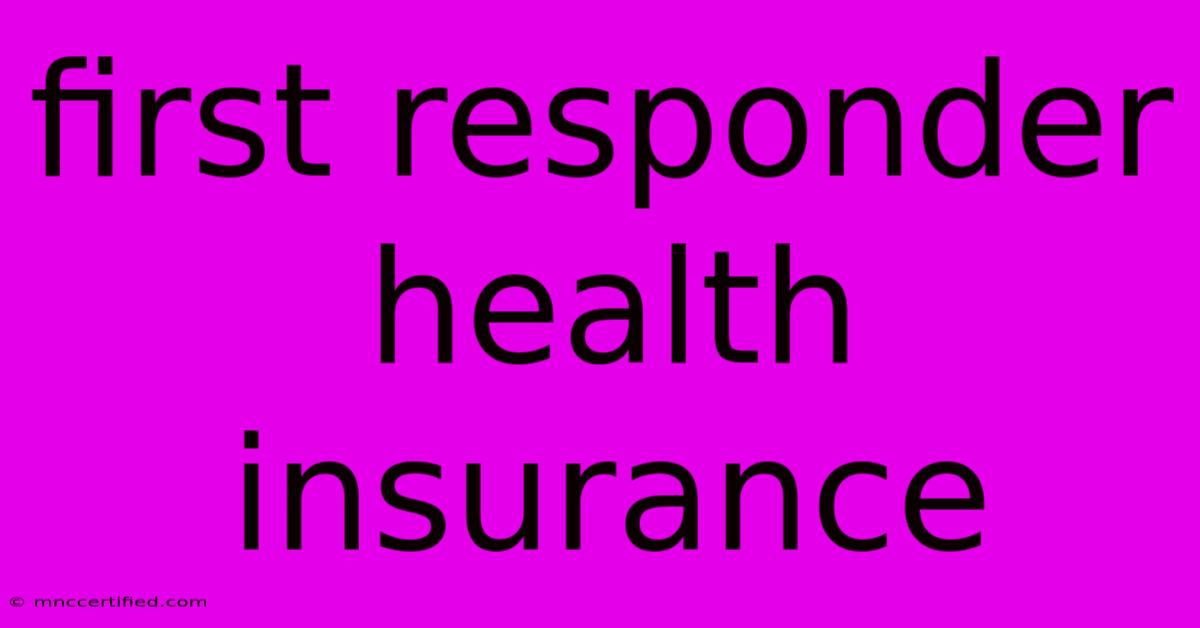First Responder Health Insurance

Table of Contents
First Responder Health Insurance: Protecting Our Protectors
First responders – police officers, firefighters, paramedics, EMTs – are the backbone of our communities, bravely facing danger to keep us safe. But their demanding jobs come with significant physical and mental health risks, making comprehensive health insurance absolutely crucial. This article explores the unique challenges faced by first responders and the types of health insurance plans best suited to meet their needs.
The Unique Health Risks Faced by First Responders
First responders are exposed to a wide range of health hazards, impacting both their physical and mental well-being. These risks include:
- Physical Injuries: Trauma from accidents, assaults, and exposure to hazardous materials are commonplace. These can lead to long-term injuries requiring extensive medical care.
- Mental Health Challenges: Witnessing traumatic events, dealing with high-stress situations, and experiencing burnout are major contributors to PTSD, anxiety, and depression.
- Exposure to Infectious Diseases: Contact with bodily fluids, contaminated environments, and infectious patients puts first responders at increased risk of contracting various illnesses.
- Shift Work and Irregular Schedules: Disrupted sleep patterns and irregular work hours can negatively impact overall health, increasing the risk of chronic conditions.
Types of Health Insurance for First Responders
Choosing the right health insurance plan is critical for first responders. Several options are available, each with its own advantages and disadvantages:
1. Employer-Sponsored Plans:
Many first responder agencies offer health insurance as part of their employee benefits package. These plans can provide comprehensive coverage, but benefits and premiums can vary widely depending on the employer. It's crucial to carefully review the plan details before enrollment.
2. Individual and Family Plans:
If employer-sponsored insurance isn't available or insufficient, purchasing an individual or family plan through the Health Insurance Marketplace or a private insurer is an option. These plans offer flexibility but require careful comparison of costs and coverage. Factors like deductibles, co-pays, and out-of-pocket maximums are key considerations.
3. Union-Sponsored Plans:
Many unions representing first responders offer health insurance plans specifically designed to meet the unique needs of their members. These plans often provide better coverage and lower premiums compared to individual plans. Check if your union offers health insurance benefits; this could be a cost-effective choice.
4. Specialized Plans for First Responders:
Some insurance providers offer specialized plans catering to the specific health risks faced by first responders. These plans may include enhanced mental health benefits, coverage for PTSD treatment, and access to specialized healthcare professionals. Researching and comparing these specialized plans is essential for maximizing coverage.
Key Features to Look for in First Responder Health Insurance:
- Comprehensive Mental Health Coverage: This is crucial given the high prevalence of mental health issues among first responders. Look for plans that cover therapy, medication, and inpatient treatment.
- Coverage for Physical Injuries and Illnesses: The plan should provide extensive coverage for injuries sustained on the job and for illnesses related to occupational hazards.
- Access to Specialized Care: Consider plans that offer access to specialists experienced in treating the unique health concerns of first responders, such as trauma surgeons and mental health professionals specializing in PTSD.
- Reasonable Premiums and Out-of-Pocket Costs: While comprehensive coverage is important, it’s essential to find a plan that fits within your budget.
Beyond Insurance: Supporting First Responder Well-being
While comprehensive health insurance is paramount, it's equally vital to support the overall well-being of first responders. This includes:
- Access to Employee Assistance Programs (EAPs): These programs offer confidential counseling and support services for mental health concerns.
- Peer Support Programs: Connecting first responders with their peers who understand their experiences can provide invaluable emotional support.
- Wellness Programs: Programs focusing on physical fitness, stress management, and healthy lifestyle choices can significantly benefit first responders' health.
Protecting our protectors requires a multi-faceted approach. By ensuring access to comprehensive health insurance and supporting their overall well-being, we can show our appreciation for the invaluable service they provide to our communities. Remember to research different plans thoroughly and choose the one that best suits your individual needs and budget.

Thank you for visiting our website wich cover about First Responder Health Insurance. We hope the information provided has been useful to you. Feel free to contact us if you have any questions or need further assistance. See you next time and dont miss to bookmark.
Featured Posts
-
Black Friday Smart Ring Deals Oura
Nov 22, 2024
-
Arrest Warrants Issued Icc Action
Nov 22, 2024
-
Motorcycle Insurance San Antonio
Nov 22, 2024
-
Liberty Mutual Insurance Layoffs
Nov 22, 2024
-
Insurance Lead Management System
Nov 22, 2024